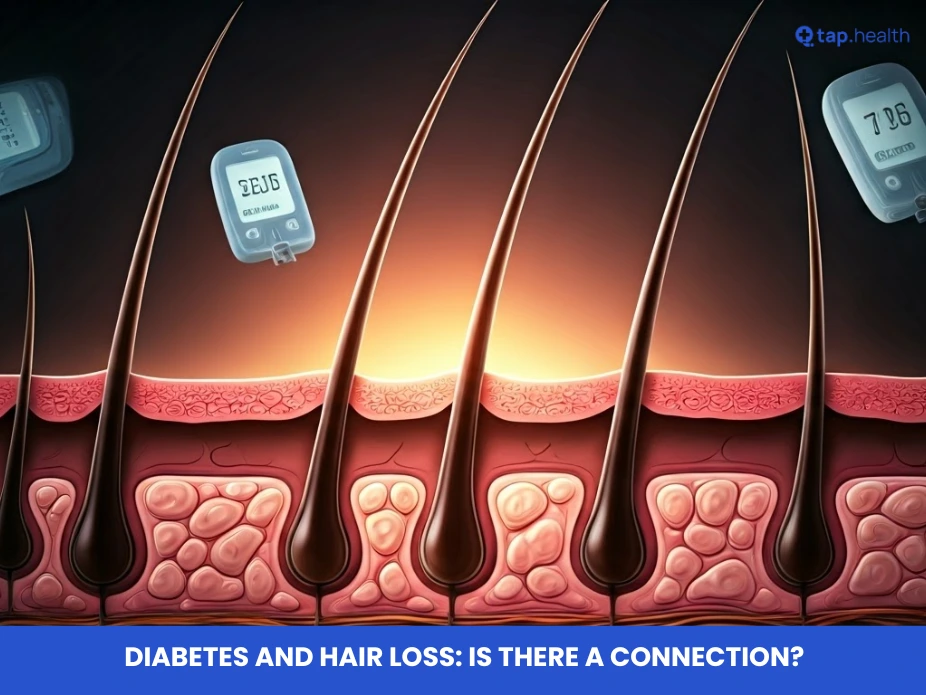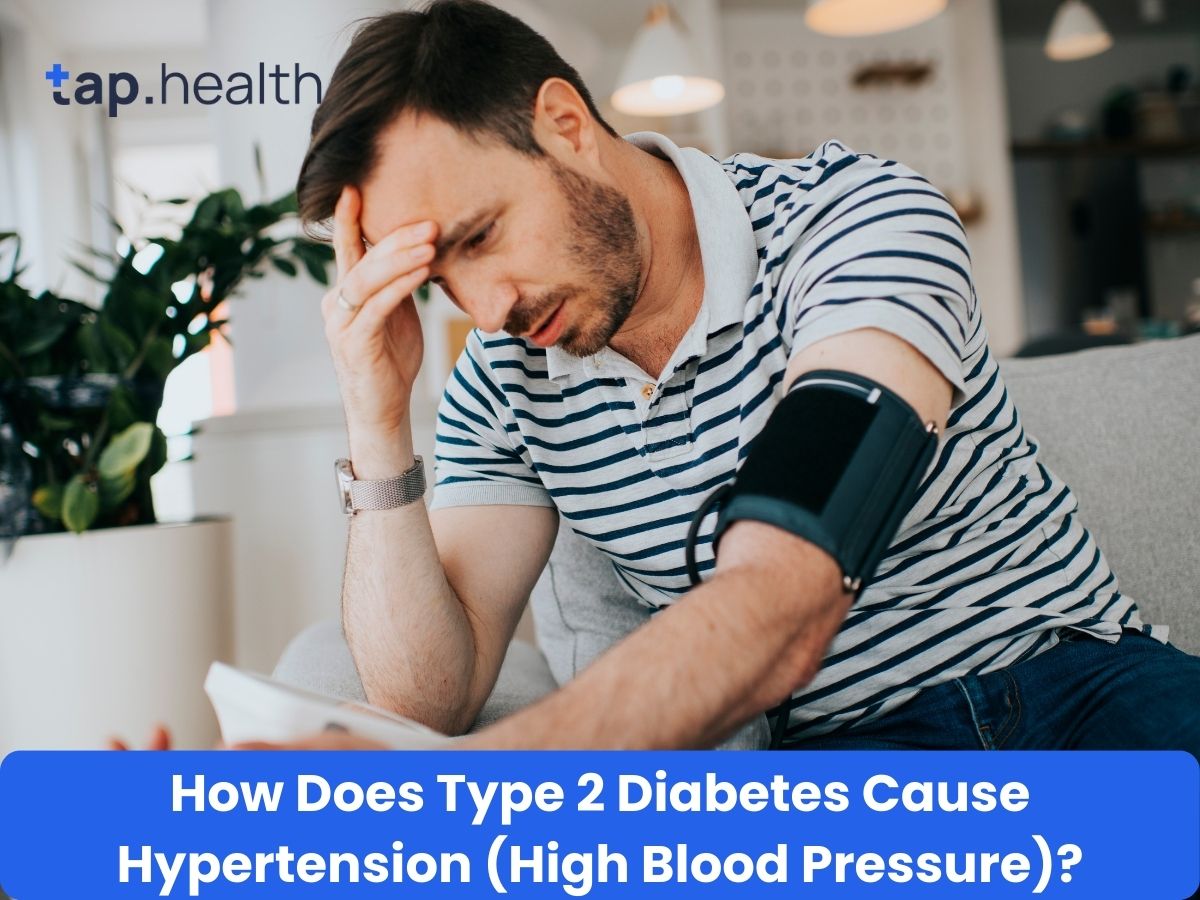Diabetes is a chronic condition affecting millions worldwide, primarily known for causing high blood sugar levels. However, its impact extends beyond blood sugar, influencing various bodily functions, including hair health. One lesser-known complication is hair loss, which can be distressing for those affected. This blog explores the diabetes and hair loss connection, delving into causes, types, prevention strategies, and treatment options to help manage this issue effectively. By understanding how diabetes contributes to hair thinning and loss, individuals can take proactive steps to protect their hair and overall well-being.
How Does Diabetes Cause Hair Loss?
Diabetes, particularly when poorly managed, disrupts the body’s normal processes, including hair growth. High blood sugar levels and insulin resistance, common in type 2 diabetes, are key contributors to hair loss. These factors impair blood flow to the scalp and disrupt the hair growth cycle, leading to thinning or shedding. Below, we explore the mechanisms behind this connection, incorporating LSI keywords like blood sugar impact on hair, insulin resistance hair loss, and diabetes-related hair thinning.
The Role of High Blood Sugar in Hair Loss
Elevated blood sugar levels, a hallmark of diabetes, can damage blood vessels, including the tiny capillaries that supply nutrients to hair follicles. These follicles rely on oxygen and essential nutrients for healthy hair growth. When blood flow is restricted due to narrowed or hardened vessels, follicles become undernourished, leading to weaker, thinner hair that is prone to falling out. Over time, this can disrupt the hair growth cycle, pushing more follicles into the resting phase (telogen), resulting in noticeable hair loss.
Insulin Resistance and Its Effect on Hair Follicles
Insulin resistance, often associated with type 2 diabetes, occurs when cells fail to respond effectively to insulin, the hormone that regulates blood sugar. Beyond its metabolic role, insulin supports hair follicle function and growth. When insulin resistance disrupts this process, it can alter the hair growth cycle, causing follicles to weaken or shrink. Additionally, insulin resistance promotes systemic inflammation, which may further damage hair follicles, increasing the risk of hair loss. Studies also suggest a link between insulin resistance and conditions like alopecia areata, where the immune system attacks hair follicles, causing patchy hair loss.
Types of Hair Loss Linked to Diabetes
Diabetes can contribute to various forms of hair loss, each with distinct characteristics. Understanding these types helps in identifying the issue and seeking appropriate treatment. Common types include telogen effluvium and alopecia areata, both of which can be exacerbated by diabetes-related factors.
Telogen Effluvium: Stress-Induced Hair Shedding
Telogen effluvium is a temporary form of hair loss triggered by physical or emotional stress, which is common in people with diabetes due to the condition’s demands. Stress hormones like cortisol can push hair follicles into the resting phase prematurely, causing excessive shedding. For diabetics, managing stress through relaxation techniques, exercise, or a balanced lifestyle can help reduce the impact of telogen effluvium and support healthier hair growth.
Alopecia Areata: Autoimmune Hair Loss
Alopecia areata is an autoimmune condition where the immune system mistakenly attacks hair follicles, leading to patchy hair loss on the scalp or other areas. While the exact cause remains unclear, factors like chronic inflammation and immune dysfunction, often seen in diabetes, may increase the risk. The condition can be unpredictable, with hair sometimes regrowing spontaneously, but repeated episodes are possible.
How to Prevent Hair Loss in Diabetics
Preventing hair loss in people with diabetes starts with effective disease management. By controlling blood sugar levels and adopting a healthy lifestyle, individuals can reduce the risk of hair thinning and promote hair regrowth. Below are key preventive measures, addressing LSI keywords like prevent diabetes hair loss and healthy hair growth tips.
Importance of Blood Sugar Control
Maintaining stable blood sugar levels is critical for minimizing diabetes-related complications, including hair loss. Consistently high glucose levels can impair blood flow to the scalp, starving hair follicles of essential nutrients. To prevent this, individuals should:
- Follow a balanced diet low in refined sugars and high in fiber.
- Engage in regular physical activity to improve insulin sensitivity.
- Adhere to prescribed medications and monitor glucose levels as advised by a healthcare provider.
Regular check-ups ensure blood sugar remains within a healthy range, supporting hair follicle health and reducing the likelihood of hair loss.
Nutritional Support for Hair Health
A nutrient-rich diet plays a vital role in maintaining healthy hair. Key nutrients include:
- Protein: Hair is primarily made of keratin, a protein, so adequate protein intake is essential for strength and growth.
- Iron: Low iron levels can contribute to hair loss, so include iron-rich foods like spinach, lentils, and lean meats.
- Zinc: Supports hair growth and repair; found in nuts, seeds, and whole grains.
- Biotin (Vitamin H): Promotes keratin production, benefiting hair, skin, and nails.
Consulting a dietitian can help tailor a diet plan to meet specific needs, ensuring optimal nutrient intake for hair health.
Treatment Options for Diabetes-Related Hair Loss
Treating hair loss in diabetics requires a dual approach: managing diabetes effectively and targeting hair loss directly. Various treatments, from medications to lifestyle changes, can help stimulate hair regrowth and improve scalp health. Here, we address LSI keywords like hair regrowth treatments and diabetes hair loss solutions.
Medications and Topical Treatments
Several treatments can address hair loss, depending on its severity and underlying cause:
- Minoxidil: A topical treatment available over-the-counter or by prescription, applied to the scalp to stimulate hair growth.
- Finasteride: A prescription oral medication for male pattern baldness, reducing hormone-related hair loss.
- Corticosteroids: Used topically or as injections to reduce inflammation in conditions like alopecia areata.
Always consult a healthcare provider before starting any treatment, as side effects are possible, and results vary by individual.
Lifestyle Changes and Home Remedies
Simple lifestyle adjustments can significantly improve hair health:
- Stress Management: Practices like meditation, yoga, or spending time in nature can stabilize stress hormones, supporting hair growth.
- Scalp Massage: Regular gentle massages improve blood flow to the scalp, nourishing hair follicles.
- Adequate Sleep: Supports overall body repair, including hair follicle health.
Home remedies like applying onion juice or aloe vera to the scalp are popular but lack strong scientific backing. Always perform a patch test to avoid allergic reactions.
The Emotional Impact of Hair Loss
Hair loss can take a toll on mental health, affecting self-esteem and body image. For individuals with diabetes, managing both the condition and its visible effects like hair loss can be emotionally challenging. Addressing the psychological impact is as important as treating the physical symptoms.
Coping Strategies for Emotional Well-Being
To manage the emotional effects of hair loss:
- Engage in hobbies, exercise, or social activities to boost mood and reduce stress.
- Join support groups to connect with others experiencing similar challenges.
- Seek professional help from a therapist or counselor to develop coping strategies and improve confidence.
Acknowledging and addressing these emotional challenges fosters resilience and supports overall well-being.
When to Seek Professional Help
If hair loss is sudden, severe, or accompanied by emotional distress, consult a healthcare provider or dermatologist. They can assess underlying causes, such as diabetes complications or other conditions, and recommend appropriate treatments. For emotional struggles, a therapist can provide tools to manage stress and improve mental health. Seeking help is a proactive step toward addressing both physical and emotional aspects of hair loss.
Conclusion
The link between diabetes and hair loss is complex, driven by factors like high blood sugar, insulin resistance, and inflammation. By prioritizing blood sugar control, adopting a nutrient-rich diet, and exploring treatment options like minoxidil or lifestyle changes, individuals can mitigate hair loss and promote regrowth. Addressing the emotional impact through coping strategies and professional support is equally vital. With a holistic approach, people with diabetes can manage hair loss effectively, improving both their hair health and overall quality of life.
Frequently Asked Questions About Diabetes and Hair Loss
1. Can improved diabetes management reverse hair loss?
While not all hair loss is reversible, controlling blood sugar levels creates a healthier environment for hair growth, improving outcomes when combined with appropriate treatments.
2. What types of hair loss are associated with diabetes?
Diabetes can lead to telogen effluvium (stress-induced shedding), alopecia areata (autoimmune patchy loss), and general hair thinning due to impaired blood flow.
3. How does high blood sugar affect hair health?
High blood sugar damages blood vessels, reducing nutrient delivery to hair follicles, which can weaken hair and disrupt the growth cycle.
4. Are there specific hair loss treatments for diabetics?
Treatments include managing blood sugar, using minoxidil or finasteride, and addressing inflammation with corticosteroids. Consult a healthcare provider for personalized recommendations.



